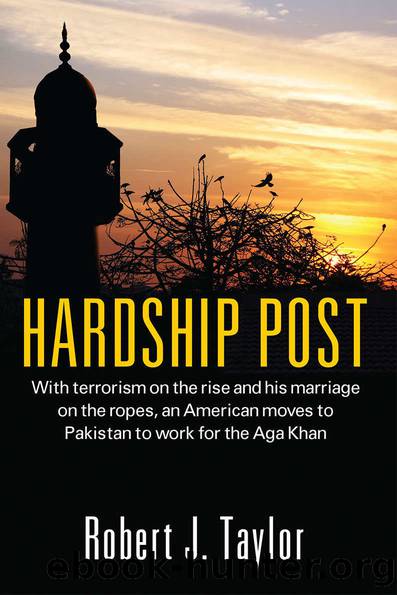Hardship Post: With terrorism on the rise and his marriage on the ropes, an American moves to Pakistan to work for the Aga Khan by Robert J. Taylor

Author:Robert J. Taylor [Taylor, Robert J.]
Language: eng
Format: epub
Publisher: Outskirts Press, Inc.
Published: 2013-06-24T22:00:00+00:00
PILLARS OF ISLAM
It was the middle of Ramazan when I got back home to Karachi. Sohir looked tired, with dark circles under his eyes, when he picked me up at the airport a little after midnight. On the drive into town I was sitting in the back seat watching his eyes in the rearview mirror. Halfway home they fluttered shut and his head drooped.
âSohir,â I yelled, and grabbed his shoulder.
âYes, Sahib,â he said, as his eyes popped open.
âYouâre falling asleep.â
âNo, no,â he protested. âI am fine.â
I talked to him the rest of the way home, touching his shoulder once in a while to keep him alert.
Sohir and I were welcomed at our gate by Abdullah, who waved a friendly hello, and by Davidâs dog, Carrie, who snarled and barked loudly until she recognized our car. I greeted Abdullah with AâSalam AâLakum and a smile and patted Carrie on the head, her tail now wagging vigorously. I told Sohir to sleep the rest of the night on the charpoi in Peter and Margaretâs room.
Over breakfast the next morning I was re-reading the newspaper I picked up on the flight into Karachi. The kidnapping in Beirut was blamed on Islamic extremists. I had been dismissing the events in the Middle EastâSadatâs assassination last fall, for example. And then in February, Syrian authorities had killed tens of thousands squashing anti-government riots. Those incidents seemed closer to us now, increasingly ominous and threatening. The purposeful targeting of Americans made it all more personal.
Who are these people?
The Muslims I knew in Karachi were anything but extreme. Yes, there were occasional squabbles between people in some of Karachiâs poor neighborhoods, and Aziz had told me about the tensions between Sunni and Shia during Muharram, but where were the extremists coming from?
I had read that more than seventy percent of all the Muslims in the world were Sunni, and fifteen percent Shia, with the balance a smattering of smaller groups. Sunnis were a majority in most Muslim countries: Saudi Arabia, Egypt, Jordan, and others. Sunnis were the vast majority in Pakistan too, but Shia were still such a sizable minority that they amounted to one of the four largest Shia populations in the world, right up there with Iran and Iraqâand Lebanon, where the American had been kidnapped.23
Were the Shia to blame? Aziz had said that the Nizari Ismailis, the followers of the Aga Khan, were Shia, a small sect with fifteen to twenty million members worldwide. From what I had observed in my first few months in Pakistan, the Ismailis were pacifists and progressive and actively engaged in the modern world. For a minority within a minority, they seemed to have prominence beyond their numbers.
I went to Aziz. âRemember, I told you Muslims are as diverse in their beliefs as Christians or Jews,â he said. âWeâve got our fundamentalists and extremists just like you do.â He paused and took off his glasses, rubbing the bridge of his nose. âAre you familiar with the pillars of Islam?â
âA little,â I said.
Download
This site does not store any files on its server. We only index and link to content provided by other sites. Please contact the content providers to delete copyright contents if any and email us, we'll remove relevant links or contents immediately.
China Rich Girlfriend by Kwan Kevin(4563)
The Silk Roads by Peter Frankopan(4533)
Annapurna by Maurice Herzog(3467)
Full Circle by Michael Palin(3449)
Hot Thai Kitchen by Pailin Chongchitnant(3386)
Okonomiyaki: Japanese Comfort Food by Saito Yoshio(2717)
The Ogre by Doug Scott(2683)
City of Djinns: a year in Delhi by William Dalrymple(2555)
Photographic Guide to the Birds of Indonesia by Strange Morten;(2533)
Vietnam, Cambodia, Laos & Northern Thailand by Lonely Planet(2457)
Tokyo by Rob Goss(2429)
Tokyo Geek's Guide: Manga, Anime, Gaming, Cosplay, Toys, Idols & More - The Ultimate Guide to Japan's Otaku Culture by Simone Gianni(2373)
Everest the Cruel Way by Joe Tasker(2342)
Discover China Travel Guide by Lonely Planet(2226)
Iranian Rappers And Persian Porn by Maslin Jamie(2198)
China (Lonely Planet, 11th Edition)(2162)
China Travel Guide by Lonely Planet(2151)
Lonely Planet China(2150)
Top 10 Dubai and Abu Dhabi by DK Travel(2102)
